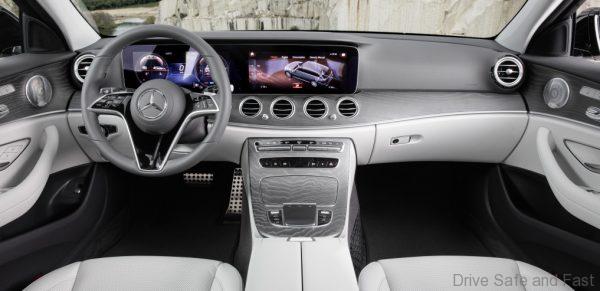Mercedes-Benz Updates Steering Wheel In 2021 starting with the E-Class.
Starting with the next generation E-Class sedan which is scheduled for unveiling this July or August 2020 but it might be delayed with COVID-19 issues, Mercedes-Benz will be updating the steering wheel with added features and also a new sporty look.

This new wheel’s rim has a two-zone sensor that can tell if the driver’s hands are on the wheel, meaning movement is not required to tell the vehicle’s driver-assist systems that the car is under control. In addition to the sensors on the outer rim, there are touch-control buttons on the spokes that work with digital signals.

The updated steering wheels expand on technology that is found on current-generation wheels found in Mercedes’ vehicles. Current Benz owners will note that Mercedes-Benz’s steering wheels have small raised touch-sensitive areas on both spokes. The pads are used to control the infotainment system through vertical and horizontal swipes. The new steering wheels that Mercedes has released here expands on the technology with more capacitive-touch switches on the spokes. The two-zone sensor allows the car to tell if the driver’s hands are on the steering wheel.
That may seem like an overly complicated way of being able to tell if a driver is holding the wheel or not, but the system works in conjunction with Mercedes’ semi-automated steering assistance function. While the system can provide some steering support for the driver, it requires the driver to have a hand on the wheel at all times.

Mercedes will offer its touch-sensitive tech in three different steering configurations with the 2021 E-Class range: Sport, Luxury, and Supersport. All of them will have a unique look that matches their names. The Luxury will have three gloss-black spokes and the airbag housed in a round casing. The Supersport configuration will have a flat bottom and three two-bar spokes for a sporty, yet interesting look.

PRESS RELEASE: In the summer of 2020, the E-Class will launch a new, comprehensively digitalized generation of steering wheels from Mercedes-Benz: the capacitive steering wheel. Its rim contains a two-zone sensor mat that detects whether the driver’s hands are gripping the steering wheel. The touch control buttons placed in the spokes also work with digital signals.
The first step towards the modern Mercedes-Benz steering wheel was taken by the then Daimler-Motoren-Gesellschaft 120 years ago: switching from a simple steering crank or steering rod to the significantly more functional steering wheel. This led to the development of today’s high-tech command centre, which enables the driver to steer precisely and, at the same time, comfortably and safely operate numerous comfort and assistance systems.

Developers and designers work hand in hand – and focus on perfecting every detail. For example, every millimetre of a circuit board determines how elegantly the surface can be designed. It’s all about looks and, above all, haptics. “Steering-wheel design is a world of its own and a very special challenge that is often underestimated,” says Hans-Peter Wunderlich, Creative Director Interior Design at Mercedes-Benz, who has been designing steering wheels for around 20 years.
“Besides the seat, the steering wheel is the only component in the vehicle with which we have intensive physical contact. The fingertips feel little things that we normally don’t notice. If an unevenness is disturbing or the steering wheel does not fit snugly in our hands, we don’t like it. This haptic sensation is sent to the brain as feedback and determines whether or not we like the car.” The emotional connection to a car is thus created through the sense of touch.
